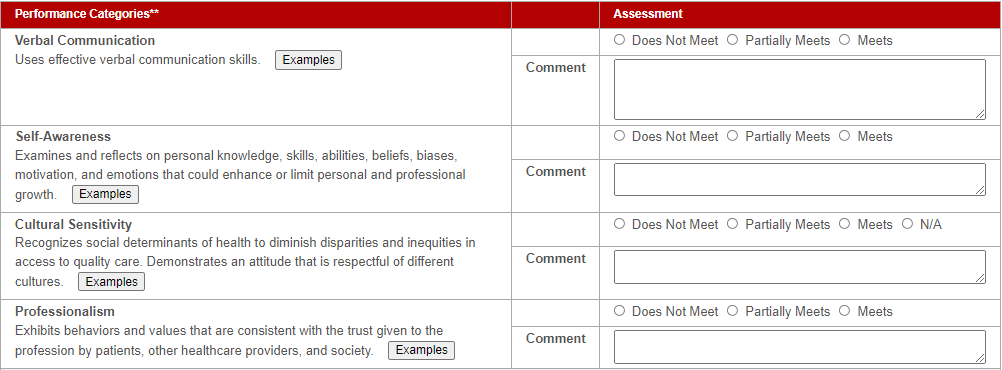728-526 Experiential Checklists & Materials
Student Performance Evaluation

Verbal Communication examples:
- Interview Patients using an organized structure, specific questioning techniques (e.g., motivational interviewing) and medical terminology adapted for the audience.
- Actively listen and ask appropriate open and closed-ended questions to gather information.
- Use available technology and other media to assist with communication as appropriate
- Use effective interpersonal skills to establish rapport and build trusting relationship.
- Communicate assertively, confidently, and clearly.
- Demonstrate empathy when interacting with others.
- Deliver and obtain feedback to assess learning and promote goal setting and goal attainment.
Self-Awareness examples:
- Uses own and others time effectively and efficiently.
- Is systematic and methodical in approaching activities.
- Sets meaningful goals.
- Plans activities to meet objectives.
- Is well prepared.
- Is able to anticipate future needs.
- Self-directed in undertaking responsibilities.
- Articulates own viewpoint when dealing with others and in addressing controversial issues.
- Speaks out against questionable tactics and practices.
- Conducts self-assessment.
- Acting on identifies strengths and weaknesses, develops a learning plan.
- Pursues further knowledge independently.
- Utilizes study design principles to gain experience in conduce of pharmacy practice research.
- Aware of how professional organizations can facilitate life-long learning needs.
Cultural Sensitivity examples:
- Recognize the collective identity and norms of different cultures without overgeneralizing (i.e., recognize and avoid biases and stereotyping).
- Demonstrate an attitude that is respectful of different cultures.
- Assess the health literacy of the patient and modify communication strategies to meet their needs.
- Safely and appropriately incorporate the cultural beliefs and practices of the patient into health and wellness care plans.
- Considers diversity factors (gender, age, sexual orientation, race, ethnicity, language, physical ability, social status) when developing health services for a diverse population.
Professionalism examples:
- Complies with laws and regulations.
- Applies good professional judgement in legal interpretations.
- Exhibits reliability and credibility in dealing with others.
- Projects professional image to patients, colleagues, and public (e.g., dress, appearance, and behavior) and assists in creating a positive climate.
- Is a team player – is supportive and respectful of other colleagues